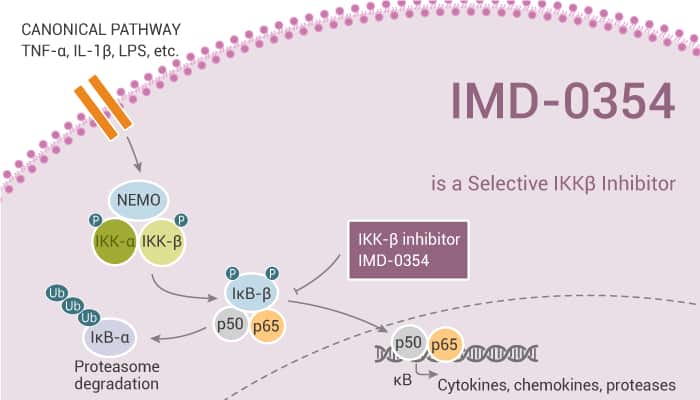IKKβ is an enzyme that is part of an intracellular signaling pathway activated by cytokines involved in triggering an immune response. Particularly, Phosphorylated IκB degrades and releases NF-κB through the ubiquitination pathway. Importantly, it enters the nucleus and participates in a variety of genes in inflammation and other immune responses. The IKK complex is composed of two kinase subunits, IKKα and IKKβ, and the regulatory subunit NF-κB of the essential regulatory factor (NEMO). Interestingly, IKKα plays an important role in skin development. IKKβ appears to mediate I in most cell types, and kappa B is the main kinase for phosphorylation.
Specifically, the phosphorylation of the high molecular weight IKK complex B on Iκ is a key regulatory step in the activation pathway. Besides, IKKβ phosphorylates mouse IRF5 at specific residues. IKKβ knockout mice showed similarly or the same phenotype as rela knockout. It is embryonic death accompanied by severe hepatocyte apoptosis. Moreover, IKKβ is the main regulator of NF-κB-dependent pro-inflammatory signal transduction. Here, we will introduce a selective IKKβ inhibitor, IMD-0354.

IMD-0354 is a Selective IKKβ Inhibitor
To begin with, IMD-0354 inhibits NF-κB activity. IMD0354 inhibits TNF-α induced NF-κB transcription activity with an IC50 of 1.2 uM. Meanwhile, IMD-0354 inhibits NF-κB activity in HMC-1 cells, resulting in complete repression of growth factor-independent proliferation of mast cells. Nonetheless, IMD-0354 suppresses HMC-1 cells proliferation in a time- and dose-dependent manner.
Next in importance, IMD-0354 with 5 mg/kg/day significantly suppresses tumor expansion in nude mice implanted with established MDA-MB-231 tumors. Obviously, the number of infiltrating cells in the aqueous humor is 53.6±9.8×105and 132.0±25.0×105 cells/mL in rats treated with 30 or 0 mg/kg of IMD-0354, respectively.
All in all, IMD-0354 is a selective IKKβ inhibitor.
References:
Tanaka A, et al. Blood. 2005 Mar 15;105(6):2324-31.